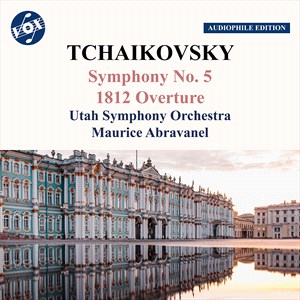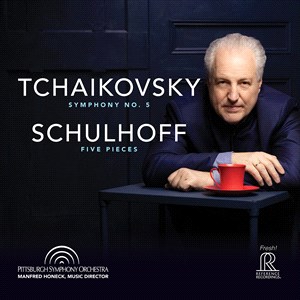


Symphony No. 5 in E Minor, Op. 64 1812 Overture, Op. 49
Here's a rather rare occurrence - two noteworthy recordings of an iconic symphony - released at the same time. The Symphony No. 5 in E Minor, Op. 64 by Pyotr Ilyich Tchaikovsky (1840–1893). One is a brand new 'live' recording with the Pittsburgh Symphony Orchestra conducted by Manfred Honeck released on Reference Recordings, and the other is a freshly remastered Naxos reissue from the VOX catalogue archives of a 1974 analog recording with the Utah Symphony Orchestra conducted by Maurice Abravanel. I've decided to mark the occasion by trying a fun experiment and doing something different on my part, which is to take a stab at a head-to-head comparison of these old and new recordings, isolated by almost 50 years of technical refinements and interpretive viewpoints. On principal I generally avoid comparisons because I strongly believe that each and every recording should be judged on its own merits, but since I was planning on reviewing both of these anyway, why not kill two birds with one stone, as the old saying goes.
Right from the very start it's immediately obvious that the audio engineering sonics of the Reference recording are much more opulent and rich, combined with an impressive dynamic range. But is that necessarily a good thing? For example, the opening two minutes of the first movement project much more gravitas and an overall sense of foreboding this way, but at the expense of the fate motif so well personified by the elegiac sound of the clarinet which unfortunately at times almost gets drowned out by the excessive girth of the orchestral strings. In the booklet notes conductor Manfred Honeck points out: "In the low strings, Tchaikovsky asks for Pesante e tenuto sempre (heavy and always held) and the music should sound broad, long and stretched." In other words it should sound ominous yes, but the focus should always be on the forlorn sounding clarinet which plays the whole symphony's cornerstone thematic melody. Something that Maurice Abravanel balances much better.
And what about that extremely beautiful solo horn melody which opens the second movement. Abravanel's tempo is perfectly judged and the horn's distance proportionately balanced, whilst in Honeck's case, the horn sounds "like a drunk in a midnight choir" bending and stretching each and every note, oozing sentimentality, and sounding as if emanating from within a cavern. Now despite the fact that he toys a bit much with the dynamics, I must give the few opening minutes of the final movement to Honeck and the Pittsburgh Symphony players. They really make this sound like a Wagnerian regal entrance march into Valhalla. Otherwise I've noticed over a few of his more recent recordings that Honeck has developed an inclination for micromanaging dynamics and orchestral balance, or lack thereof. The brass instruments should sound like they are sitting in the back of the orchestra Manfred.
Another important point to Abravanel's advantage is the extra piece on the disc. I can understand the need to include hitherto lesser known works by lesser known composers into concert programs in order to expose them to the listening public, but the 1812 Overture makes for a more coherent musical experience than Erwin Schulhoff's 5 Pieces for String Quartet. Mind you it certainly demonstrates that Manfred Honeck has solid orchestration skills, but the music detracts too much from the Tchaikovsky sound.
In conclusion, if you are one of those for which state of the art audio engineering offered in Hybrid-SACD format is a top priority, the Reference Recordings version should be a no-brainer. But if you don't mind a less voluminous and yet highly decent recording from 1974 that doesn't bend Tchaikovsky's music to its will, then go for the Vox Classics.
Jean-Yves Duperron - July 2023 Abravanel - Opening MovementHoneck - Opening Movement